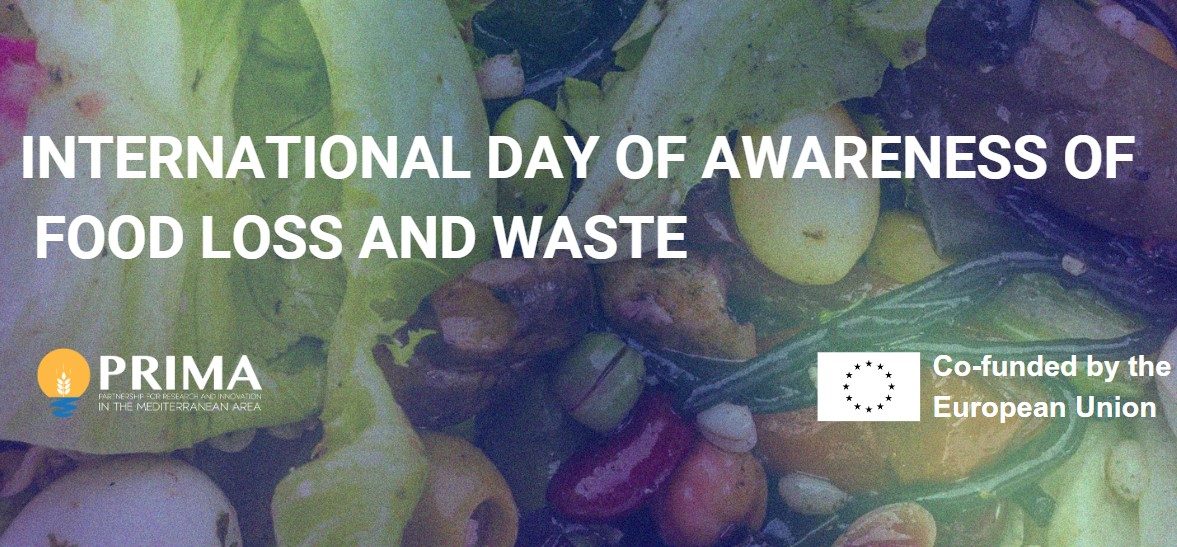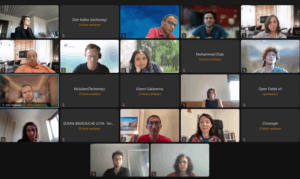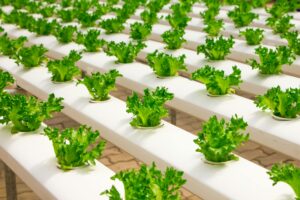As the world marks International Day of Awareness of Food Loss and Waste on September 29, a staggering amount of food is being wasted every year. According to the FAO, in developing countries, about 40% of food loss happens post-harvest, while in industrialized nations, over 40% occurs at the retail and consumer levels[1]. In the Mediterranean, the issue is even more complex due to environmental challenges, a lack of infrastructure, and inefficient food systems.
PRIMA is tackling this issue by funding solutions across the entire food chain, uniting research teams throughout the Mediterranean.
The Mediterranean food loss crisis
Food loss is a multifaceted problem that impacts food security, environmental sustainability, and economic stability. The Mediterranean region faces several challenges: poor transportation infrastructure, lack of cold storage, and insufficient food safety standards lead to significant food loss even before products reach consumers.
But the issue is not just logistical. Climate change, water scarcity, and pests are taking a toll on the region’s food production. Finding solutions to food loss is crucial, not only to improve food security but also to combat climate change and promote sustainable development.
PRIMA’s approach: a holistic strategy
Addressing food loss encompasses two dimensions: prevention, which focuses on implementing diverse solutions to minimize losses from production through to market, and a restorative approach that prioritizes recycling and valorization.
Prevention: From Production to Market
PRIMA’s approach is looking at food loss across the entire cycle—from pre-production all the way to the consumer. By funding cutting-edge research and innovation, PRIMA focuses on several key stages:
- Pre-production:
PRIMA supports research into plant and animal genetics, as well as ecology, to develop resilient crops and breeds. These innovations are built to handle the environmental pressures of the Mediterranean, like heat and drought, allowing farmers to reduce losses even before they harvest.
For instance, projects like CAMA are developing heat and drought-resistant varieties of peas and alfalfa, while GENDIBAR focuses on enhancing barley’s resilience to heat. Other initiatives such as CERALMED aim to create drought and disease-resistant legume-cereal mixes, and MEDBERRY is working on strawberries that can withstand downy mildew.
- During production:
On the farm, pests and pathogens can cause severe damage, leading to significant food loss.
PRIMA-funded projects focus on finding new methods for pest control and improving farm management techniques to reduce these risks.
PRIMA-funded projects like INTOMED are dedicated to sustainable pest control by advancing research on microbe-plant-arthropod interactions, particularly for key Mediterranean crops. Other projects apply innovative techniques such as using aromatic plants like Plant B to attract pollinators and beneficial insects, natural hive treatments to protect bees from the wax moth, and entomopathogenic treatments to combat varroa mites. Additionally, various projects are dedicated to developing vaccines to protect livestock and aquaculture species, including LAGMED for rabbits, BLUEMED for sheep, and SUPERTROUT for trout.
- Post-harvest and transport:
In Mediterranean countries, food often spoils during transportation due to a lack of proper logistics and cold chain infrastructure. PRIMA is working to improve food safety, quality standards, and traceability across the supply chain. These improvements ensure that food remains safe and consumable by the time it reaches markets.
For instance, the Greendriedfruits project is focused on developing innovative post-harvest treatments to extend the shelf life and maintain the quality of dried fruits, helping prevent spoilage and ensuring these products remain suitable for consumption. Meanwhile, Nano4Fresh is pioneering the use of advanced air purification systems, incorporating nanoparticles to create a controlled environment during the transport and storage of fruits and vegetables. This system aims to delay ripening and reduce spoilage, ultimately improving the longevity of fresh produce in transit. Additionally, the SUREFISH project is dedicated to enhancing traceability throughout the fish supply chain, implementing advanced tracking technologies to monitor every stage, from catch to consumer. This ensures that fish products maintain their quality, safety, and freshness, offering consumers a more reliable and transparent source of seafood while reducing food waste across the distribution network.
- At the Consumer Level:
Once food reaches stores and consumers, it’s crucial to prevent waste. PRIMA is promoting the development of sustainable packaging materials that extend the shelf life of products. These materials, often derived from agricultural by-products, are designed to reduce waste while also being environmentally friendly.
The Biopromedfood project, for instance, is exploring the use of algae-based solutions to protect fresh products, offering a natural and eco-conscious way to preserve food quality. Similarly, Agrifish focuses on producing fish feed using agricultural waste, such as grape seeds and cereal by-products, contributing to a circular economy that reduces food loss. Another initiative, BioFreshCloud, is dedicated to improving the shelf life of fresh produce like strawberries and tomatoes in Mediterranean climates. By implementing eco-friendly preservation methods, BioFreshCloud extends freshness without the use of harmful chemicals, helping reduce waste and support more sustainable food systems.
Restorative approach: transforming waste into valuable resources
PRIMA is embracing a restorative approach to tackle food loss by transforming waste into valuable resources through recycling and valorization strategies. Projects such as FrontAg Nexus and ADVAGROMED focus on repurposing agricultural by-products to create fertilizers and livestock feed, contributing to more sustainable and resilient farming systems. ADVAGROMED specifically harnesses the power of insects as bioconverters of local by-products, utilizing insect products like frass (insect droppings) and live larvae to support agroecological practices. Similarly, the FrontAg Nexus project integrates diverse technologies such as hydroponics, aquaponics, insect farming, vermiculture, and agro-photovoltaics to optimize resource use in agriculture.
Tackling Food Waste: preservation methods for rural communities
In rural areas, where access to electricity is limited, preserving food can be a major challenge, leading to increased food waste. This is where projects like ArtiSaneFood come into play. ArtiSaneFood focuses on the development of fermented products, which are naturally easier to preserve without the need for refrigeration. Fermentation not only extends the shelf life of food but also offers a sustainable alternative for communities facing energy constraints. By promoting traditional and eco-friendly preservation methods, ArtiSaneFood provides a practical solution to food spoilage and waste, making it particularly beneficial for rural areas with limited infrastructure.
——————————————————
FoodLoss: A Key Priority for PRIMA in 2024:
The primary focus of PRIMA’s latest call, launched in early 2024 under Thematic Area 3: Food Value Chain in the Nexus, is to develop cost-effective and sustainable technologies tailored to Mediterranean food systems to reduce food loss and waste. This call seeks to support the deployment and demonstration of sustainable solutions aimed at minimizing food losses, conserving energy, and improving food safety during postharvest activities such as transportation, storage, and processing. It specifically targets plant-based foods and waste, emphasizing that these solutions should be scalable, sustainable, cost-effective, and suitable for smallholders in rural areas with limited access to electricity.
A global impact: food loss and climate change
Addressing food loss is not just about feeding more people—it’s also about protecting the planet. When food is wasted, the energy, water, and resources used to produce it are also wasted. Worse, rotting food contributes to greenhouse gas emissions, exacerbating climate change.
PRIMA’s initiatives align with global goals, such as the UN’s Sustainable Development Goal Target 12.3, which aims to halve per capita global food waste by 2030 and reduce food loss along production and supply chains. The European Union’s Farm to Fork strategy also includes food loss reduction as a key pillar in its mission to build a sustainable, fair food system.
[1] ⁵ FAO (2011) “Global food losses and food waste. Extent, causes and prevention”. Rome




